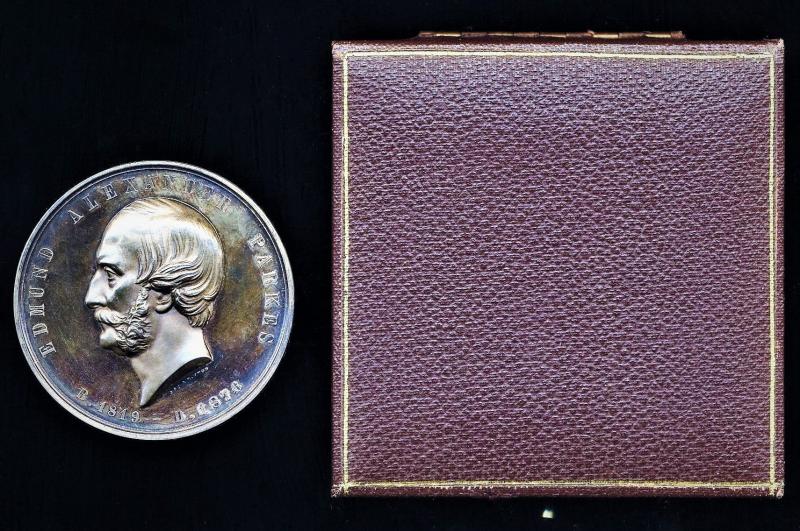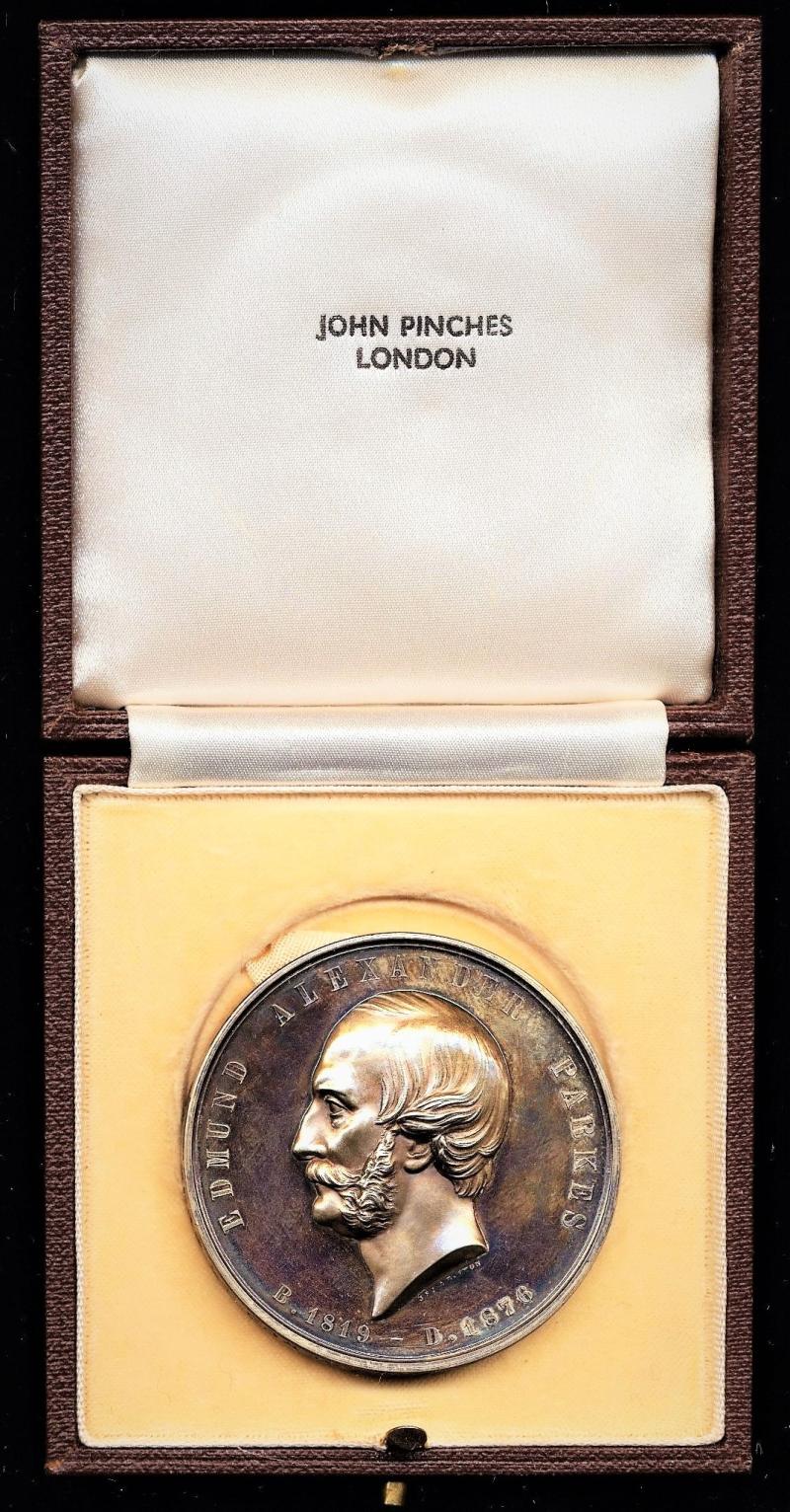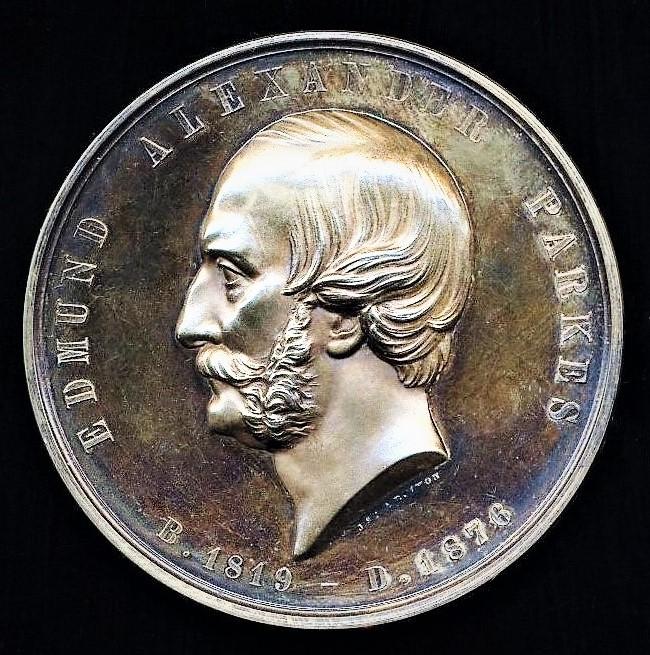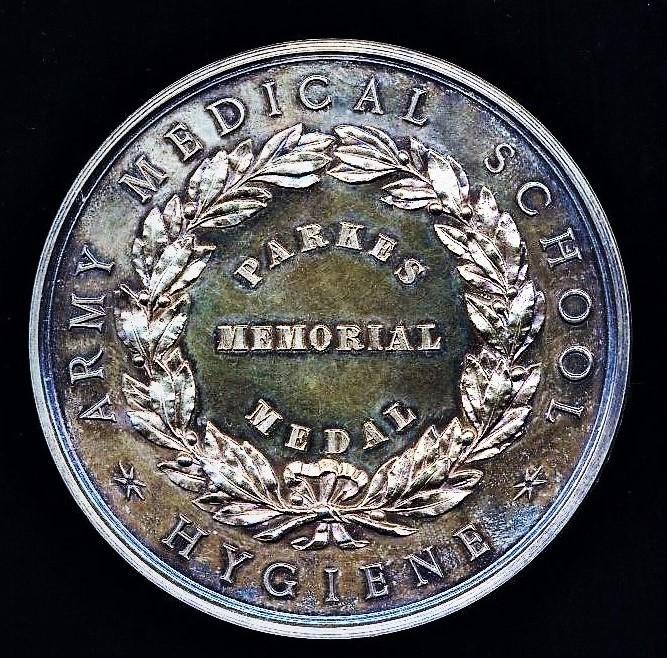British Armed Forces: Royal Army Medical College. Parkes Memorial Medal. Gold Medal (Silver gilt) (Surg Lt Cdr W D McNicoll RN 1978)
Sold together with plush leatherette hinged 'John Pinches London' case of issue
Metal: Silver gilt
Weight: 81g
Dimension: 51mm
Obverse: Portrait bust of Sir Edmund Alexander Parkes. With legend 'Edmund Alexander Parkes' and below the dates 'B. 1819 - d. 1876'
Reverse: A Laurel Wreath with central inscription on 3 x lines 'Parkes Memorial Medal', this surrounded by the legend 'Army Medical School' and below the word 'Hygiene'
Important: This is the rare 'Gold' (actually silver gilt) issue of the Parkes Memorial Medal - only awarded once every three years - the first award being issued in 1881 (The Lancet refers) and not to be confused with the annual 'Bronze' grade awards which latter were awarded to medical officers who top their respective examinations at the end of each session, and which latter date from 1878!
The Parkes Memorial Medal was first instituted by the Army Medical School as a triennial prize of seventy-five guineas, and a large gold medal bearing Parkes's portrait, was established for the best essay on a subject connected with hygiene, the prize to be open to the medical officers of the army, navy, and Indian service of executive rank, on full pay; and a bronze medal, also bearing the portrait of Parkes, was instituted, to be awarded at the close of each session to the best student in hygiene.
The award was suspended during the Wold Wars, including no awards being made for eight years during the War Years of the Second World War & Post-War era, but was re-introduced as from 1947. The 1946 edition of the Journal of the Royal Army Medical Corps, published on 1 October 1946, carried the below notice pertaining to the award of the Parkes Memorial Medal:
Quote,
PARKES MEMORIAL PRIZE. A silver-gilt medal and a sum of approximately £60 to the regular serving medical officer on full pay of the Royal Navy, the Army, or the Indian Army who in the opinion of the Prize Committee by professional work of outstanding merit has done most to promote the study of naval or military hygiene. First consideration will be given to the authors of original articles or reports of investigations of value from the point of view of naval or military hygiene published in one or other of the various medical journals. Part authorship of any article will not be considered as justifying an officer to be recommended for this prize. . The Alexander Memorial Prize and the Parkes Memorial Prize are not open to officers on the staffs of the Royal Naval Medical School, the Royal Army Medical College or the Army School of Hygiene. . Recommendations should be sent in through the usual channels with -copies of original articles or reports of investigations as required to reach the Hon. Secretary, R.A.M.C. Prize Fund Committee, R.A.M. College, Millbank, London, S.W.I, by December 31, 1946.
Unquote.
William Dudley McNicoll was the son of a Scottish father Charles Aitken McNicoll (1917-1941, a brilliant young Indian Civil Service gazetted officer, who was holding the appointment post of Assistant Magistrate & Collector at Burdwan)) and a Eurasian (Burma born) mother Doroethea Sarah Harrison McNicoll (nee Harrison-Xavier).Tragically, William never knew his father as the latter died when William was in his infancy. William was baptized in Rangoon, Burma, only months prior to the evacuation of Rangoon. His mother subsequently re-married, at Bangalore, India, in 1947, when she married James Alan Grant
Interestingly in early 1982, 'Bill' had - surprisingly - tendered his request to resign from the Royal Navy after 18 years service, with intention to take up an appointment in North Northamptonshire (at King's Mill Hospital near Mansfield), however his request was declined (or rather postponed)as his special services were required during the Falklands War during which he was posted on duty at Plymouth for the duration of the South Atlantic Campaign
Surgeon Lieutenant-Commander (later Commander) William Dudley McNicoll, Royal Navy, was awarded the 'Parkes Memorial Medal' in 1978. The 'Parkes Memorial Medal' - only awarded triennially - remains the most prestigious medical prize award open to commissioned medical officers of the British Armed Forces, in respect of outstanding achievement in medical science & research
Following his death, detailed professional obituaries, with portrait, were published in both the British Medical Journal and the Journal of the Royal Navy Medical Service. For the latter see the obituary citation 'Bull PT. Surgeon Commander W.D. (Bill) McNicoll FRCS RN (Retd), 1940-2014. J R Nav Med Serv. 2014;100(3):363-4. PMID: 25895425'
A former pupil of The King's School, Canterbury, England, the below following obituary was published in the OKS Publication 'For The Record' issue No 21 Lent 2015:
Quote,
Bill McNicoll was at King’s, in Luxmoore, from 1954 to 1959. He excelled at hockey and tennis, gaining colours at both sports.
After King’s, he went straight to Guy’s Hospital in London to qualify as a Doctor, which he achieved in 1965. He continued his training and studied to become a Surgeon. He qualified as an MRCS in 1967 and an FRCS in 1976. He had been sponsored during his training by the Navy and, after completing his training, he joined the Navy as his career.
He had a very distinguished career in the Navy, starting as a Surgeon Lieutenant at the Royal Naval Hospital, Devon and rising through promotion over the years to Surgeon Commander. He specialized in Otolaryngology, which is more easily described as ENT. He rose to become Senior Specialist and Consultant at the Royal Naval Hospital in Portsmouth. His particular specialization was with the problems associated with Divers and he became one of the acknowledged experts in this field. Hence, his personal email address was Diverhelp. He was author or co-author of eleven publications in his field.
After retiring from the Navy, Bill became a GP in Mansfield and also Senior Consultant Otolaryngologist at King’s Mill Centre in Nottingham.
Bill was a very active Freemason, being a member of ten Lodges and having been WM of most of them. He was also President of his local Rotary Club. He was a tireless worker for Masonic and non-Masonic charities, arranging regular charity balls and fetes.
Sadly, Bill suffered a series of strokes in 2000 and had to retire early. However, he continued with his Charity and Freemasonry activities, despite the handicap of loss of movement in hands and legs.
He died in September 2014 at the age of 73
Unquote
A rare award seen named to a Royal Navy Surgeon
Condition: EF
Code: 21508







